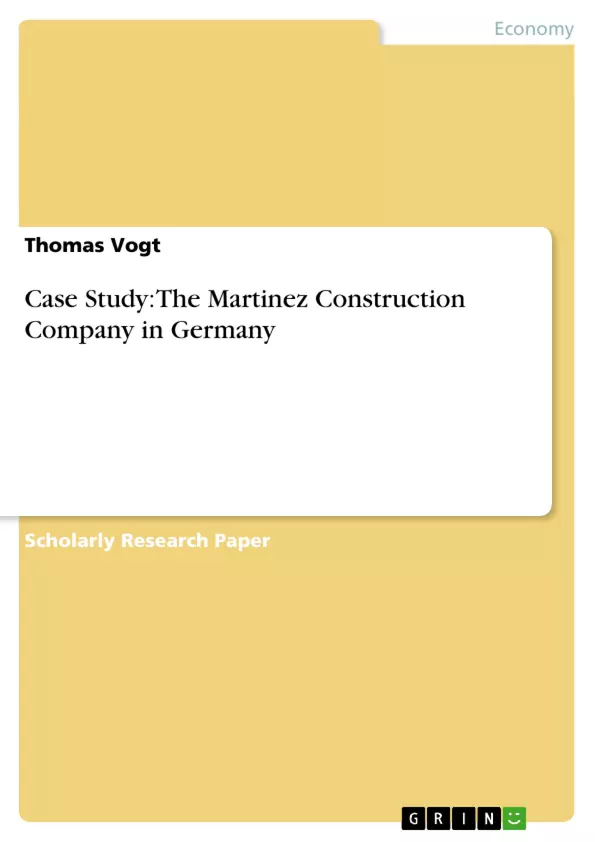This case study is about a company called Martinez Construction, a well-established construction company located in eastern Spain. The company was founded in the mid-1940s and has been in the hands of the Martinez family since then. Most probably the company was a small- to medium-sized enterprise (SME) with a limited amount of resources and capital operating in one country so far. After the fall of the Iron Curtain between Western and Eastern Europe and the reunion of West and East Germany (1989), Martinez Construction thought about the development of Germany as new foreign market for expanding their business operations.
Inhaltsverzeichnis (Table of Contents)
- Introduction
- Case Study Questions
- Were the Spanish prepared for the problems faced in the negotiations? If not, what might the Spanish have done to be better prepared?
- How did the Spanish interpret the actions of the Germans?
Zielsetzung und Themenschwerpunkte (Objectives and Key Themes)
This case study focuses on the international expansion of Martinez Construction, a Spanish construction company, into the East German market after the fall of the Berlin Wall. The case explores the challenges faced by the company in navigating cultural differences and negotiating with the Treuhandanstalt (THA), the privatization agency responsible for managing former East German state-owned companies.
- Cultural differences and their impact on international business negotiations.
- The importance of thorough market research and strategy development for international expansion.
- The role of intercultural communication and negotiation skills in achieving successful business outcomes.
- The challenges of adapting to new business environments and navigating unfamiliar cultural norms.
- The impact of cultural dimensions on business practices and decision-making.
Zusammenfassung der Kapitel (Chapter Summaries)
- Introduction: Introduces Martinez Construction, a Spanish construction company, and its decision to expand into the East German market after the fall of the Iron Curtain. The chapter highlights the company's motivations for internationalization, including diversification and seeking new growth opportunities.
- Case Study Questions: This section delves into the rationale behind Martinez Construction's decision to enter the international market, examining whether it was proactive or reactive. It explores various reasons why companies become multinational enterprises (MNEs) and highlights the specific factors that influenced Martinez Construction's choice.
- Were the Spanish prepared for the problems faced in the negotiations? If not, what might the Spanish have done to be better prepared?: This chapter analyzes the Spanish company's preparedness for negotiating with the Treuhandanstalt (THA) and acquiring a company in East Germany. It examines the challenges of cultural differences, the importance of market research, and the need for a well-developed international expansion strategy.
Schlüsselwörter (Keywords)
Key terms and concepts explored in the case study include internationalization, multinational enterprise (MNE), cultural differences, negotiation, intercultural communication, market research, strategy development, Treuhandanstalt (THA), privatization, Hofstede's cultural dimensions, and ethnocentric approach.
- Citar trabajo
- Thomas Vogt (Autor), 2007, Case Study: The Martinez Construction Company in Germany, Múnich, GRIN Verlag, https://www.grin.com/document/91905



